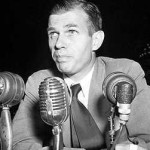Hiss, Alger (1904 – 1996)

Alger Hiss
A lawyer and longtime New Dealer who, as a member of the U.S. State Department in 1945, served as Secretary-General of the San Francisco Conference which organized the United Nations. In 1948, he was first accused by Whittaker Chambers of having been a Communist and a Soviet espionage agent in the 1930s, and in 1950 he was convicted of perjury in connection with this charge. Although evidence revealed in the years after Hiss’s conviction has turned up considerable new information on the case, the question of his guilt or innocence remains controversial. Until his death, Hiss maintained that he was innocent – and waged repeated legal battles to clear his name.
Born in Baltimore, MD, Hiss graduated from Johns Hopkins University and in 1929 received his law degree from Harvard Law School, where he was a protégé of Felix Frankfurter, the future Supreme Court Justice. Upon graduation, he was chosen for the honor of serving for one year as secretary to Supreme Court Justice Oliver Wendell Holmes, Jr. In late 1929, Hiss married the former Mrs. Priscilla Hobson, a Bryn Mawr graduate. On October 30, 1930, he joined the law firm of Choate, Hall & Stewart in Boston. In the spring of 1932, Hiss moved to New York – following his wife, who had moved there the winter before – and joined the corporate law firm of Cotton, Franklin, Wright & Gordon. In 1933, he entered government service as an attorney with the newly formed Agricultural Adjustment Administration (AAA).
In 1934, Hiss was loaned to the Senate Special Committee on Investigation of the Munitions Industry, commonly known as the Nye Committee, which was investigating profiteering by military contractors during World War I. In 1935-1936, Hiss served briefly in the United States Department of Justice before joining the Department of State in September 1936 as an aide to Assistant Secretary of State Francis B. Sayre. In 1939, Hiss became an assistant to Stanley K. Hornbeck, then the State Department Adviser on Political Relations for Far Eastern Affairs. In 1944, Hiss was appointed special assistant to the Director of the Office of Special Political Affairs (OSPA), a policy-making office that concentrated on postwar planning for international organizations. In this capacity, he was executive secretary at the Dumbarton Oaks Conference, which finalized plans for the organization that would become the United Nations. He later became the director of OSPA.
In February 1945, Hiss was a member of the U.S. delegation to the wartime Yalta Conference, where the “Big Three” (Franklin D. Roosevelt, Joseph Stalin and Winston Churchill) met to coordinate strategy to defeat Hitler, draw the map of postwar Europe and continue with plans to set up the Organization of the United Nations. Hiss’s role at Yalta was generally limited to work on the United Nations. In April-June 1945, Hiss served as the secretary-general of the United Nations Charter Conference in San Francisco, which established the Organization of the United Nations and adopted its charter. Hiss brought the United Nations charter to President Harry Truman in Washington, D.C. In 1945-1946, Hiss worked closely on the problems of the United Nations Organization. In December 1946, he left government service to become president of the Carnegie Endowment for International Peace, where he served until May 5, 1949, when he resigned three weeks before the beginning of his first perjury trial.
In August 1948, Hiss was publicly accused by the ex-Communist and Time editor, Whittaker Chambers, of having been a member of the Communist underground in the 1930s. These charges led to Hiss’s two perjury trials and his conviction in January 1950. He was sentenced to five years and served 44 months at the federal penitentiary in Lewisburg, PA before being released in November 1954. In 1957, Hiss published a book, In the Court of Public Opinion, refuting the prosecution’s case in his perjury trials. In 1988, he wrote an autobiography, Recollections of a Life. Hiss maintained his innocence and fought his perjury conviction until his death on November 15, 1996, at age 92.
To see how Whittaker Chambers’s story checks in the Russian and American documentation read:
To see the documentary crosschecking of Hede Massing’s evidence at Alger Hiss’ second perjury trial, read:

